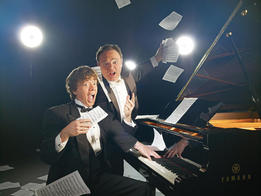
For any who may not know it (and if you don’t, I must wonder where you’ve been), this is a play about studying the piano. It’s the creation of the Canadian actor-pianists Ted Dykstra and Richard Greenblatt – a kind of quasi-autobiography of their childhood and teen years as they pursued the dream of becoming concert pianists.
Every night, they manage to pack the house with a crowd that gets jokes about the relative minor of A flat major. Indeed, it soon became apparent to me that most of the people in attendance had been subjected to piano lessons (or some kind of music tutelage) – as they giggled knowingly at practice-avoidance strategies, the horrors of piano competitions and outrageously pretentious music teachers.
I wrote “subjected to piano lessons” in the last sentence – and that may sound harsh. But let’s face it, a great many children who find themselves seated on a piano bench practicing scales are not there of their own volition. And even those who have serious pianistic ambitions and want to excel sometimes wish they were outside playing with their friends. They know all too well that they are sacrificing a “normal” childhood for the sake of music.
Sadly, as we see in 2P4H, it’s those who are serious who are most likely to experience serious hurt when they hit a brick wall in their progress and realize they’ll never make it to Carnegie Hall. But even casual students don’t always come through the trials and tribulations of music lessons emotionally unscathed.
And this is where Dykstra and Greenblatt step in and make themselves useful. Together, they are a two-man healing circle, inviting their audience to laugh at past pain and bringing closure to difficult unresolved issues. Magnanimously, 2P4H absolves everyone: the parents who insist on music instruction as a bourgeois rite of passage; the teachers and adjudicators who run the piano-lesson mill for their own profit; and the kids who lack discipline, or fall victim to their own unrealistic dreams.
Two Pianos Four Hands is a therapeutic and cathartic experience for anyone who studied music as a child. It worked for me.
© Colin Eatock 2011
 RSS Feed
RSS Feed

